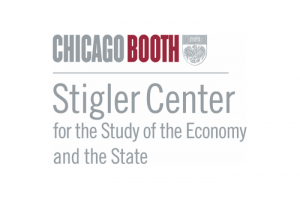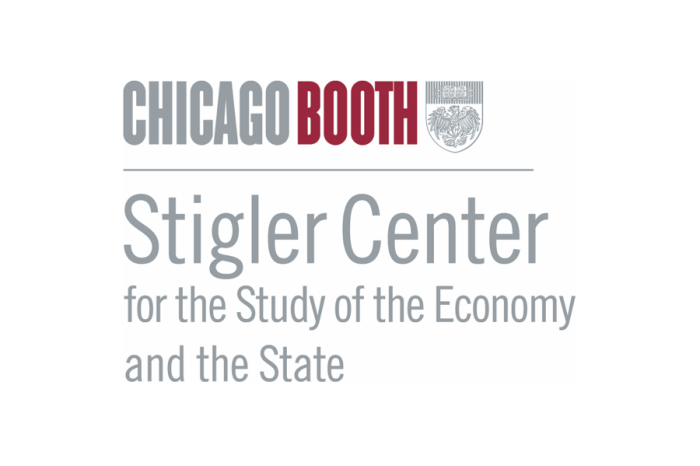The invitation-only conference will bring together economists, law scholars, intellectuals, venture capitalists, and businesspeople to debate how to promote competition in a world of network effects.

On April 19 and 20, 2018, the Stigler Center will dedicate its annual Antitrust and Competition conference to the topic of “Digital Platforms and Concentration.” Issues to be discussed at the conference include, among others:
- The characteristics and market power of two-sided markets
- How competition can be promoted in a world of network effects
- The economics of free products and the challenges they pose to antitrust and existing law
- The collection, monetization, and ownership of personal data
- Digital companies’ foray into the physical world
- How and to what degree digital companies are involved in political decision making
- How the startup ecosystem is affected by the presence of big players
The invitation-only conference will bring together economists, law scholars, intellectuals, venture capitalists, and businesspeople for two days of discussion. The keynote speakers will be Makan Delrahim, assistant attorney general of the Department of Justice’s Antitrust Division; Alvin Roth, the 2012 Nobel laureate in economics; and Jean Tirole, the 2014 Nobel laureate in economics.
Last year, the Stigler Center brought together dozens of top scholars in law, economics, history, and political science, along with policymakers and journalists, for a three-day conference dedicated to debating whether America had a concentration problem. Among the topics discussed were the empirical evidence on the effects of a reduction in competition, the relation between market power and inequality and the role and scope of antitrust policy in an age of big data and winner-take-all digital platforms.
While opinions on the existence and the magnitude of the problem differed, a majority of voices at the conference expressed concern that the permissive antitrust policy started in the early 1980s might have gone too far. This concern was immediately echoed in the media. In fact, since the conference the number of articles in the press decrying a monopoly problem in America has skyrocketed.
One of the main area of concerns that emerged at last year’s conference was the dominant position of digital platforms and, more generally, of Big Tech. Once celebrated as brilliant innovators that make the world a better place, during the last year Big Tech has faced a fierce backlash (relabeled “techlash” by The Economist). Facebook is dealing with mounting criticism over the role it played during the 2016 presidential election and its vulnerability to political propagandists, Google has been charged and fined by European antitrust regulators for anti-competitive conduct and is still being investigated, and Amazon is faced with increased scrutiny over its rapid growth and its impact on labor, small businesses, and the economy at large. That 2017 has been a turning point for the public perception of digital platforms seems like an understatement: once a taboo thought, the idea of breaking up Facebook, Google, and Amazon (like the similarly dominant Standard Oil and AT&T before them) is now routinely brought up in the pages of the Wall Street Journal, The Economist, and Esquire.
“In 2017 we launched our antitrust and concentration conference with a broad perspective on the entire US economy,” said Guy Rolnik, co-organizer of the conference and a clinical professor of strategic management at Chicago Booth. “This year’s conference focuses on the internet and the digital platforms that raise many concentration-related challenges in the digital economy, the news media, politics, and democracy”
As they continue to grow and spread into new areas, digital platforms are not only transforming communication, media, and retail, but have the potential to disrupt many other industries as well. Is the case for intervention sufficiently strong? Is so, what form this intervention should take: regulation, break-ups, or forced divestments? Alternatively, should digital platforms be forced to open their networks to allow data portability? What are the risks of stymying innovation that these different forms of intervention are likely to produce?
“These are the key questions of our time,” stated Luigi Zingales, academic director of the Stigler Center and the other co-organizer of the conference. “For this reason, we decided to bring together the best minds in the world on this topic to debate these issues and try to come up with a consensus answer.”
In the remaining weeks leading up to the conference ProMarket will publish several contributions of conference participants. These contributions will be collected together in an e-book that will come out shortly before the conference to set the stage for a lively debate at the conference.
[Editors’ note: See also our 2017 conference volume Is There a Concentration Problem in America? for a review of the inaugural Stigler Center antitrust conference.]
Disclaimer: The ProMarket blog is dedicated to discussing how competition tends to be subverted by special interests. The posts represent the opinions of their writers, not necessarily those of the University of Chicago, the Booth School of Business, or its faculty. For more information, please visit ProMarket Blog Policy.






